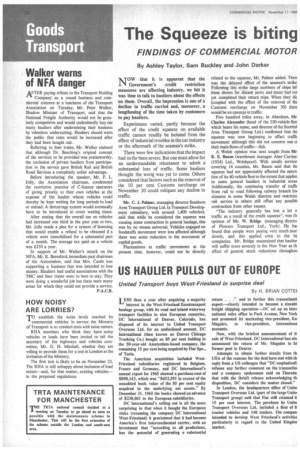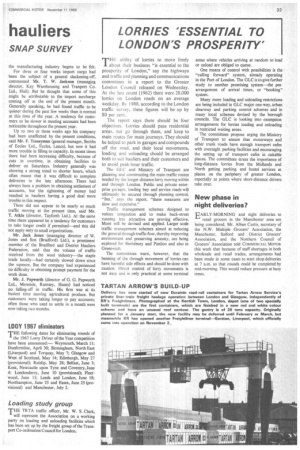The Squeeze is biting hauliers
Page 34

Page 35

If you've noticed an error in this article please click here to report it so we can fix it.
FINDINGS OF COMMERCIAL MOTOR SNAP SURVEY
By Ashley Taylor, Sam Buckley and John Darker
NOW that it is apparent that the
Government's credit restriction measures are affecting industry, we felt it was time to talk to hauliers about the effects on them. Overall, the impression is one of a decline in traffic carried and, moreover, a lengthening of the time taken by customers to pay hauliers.
Experiences varied, partly because the effect of the credit squeeze on available traffic cannot readily be isolated from the effect of industrial troubles in the car industry or the aftermath of the seaman's strike.
There were few indications that the impact had so far been severe. But one must allow for an understandable reluctance to admit a substantial loss of traffic. Some hauliers thought the worst was yet to come. Others considered that factors such as the removal of the 10 per cent Customs surcharge on November 30 could mitigate any decline in traffic.
Mr. C. J. Palmer, managing director Southern Area Transport Group Ltd. (a Transport Development subsidiary, with around 1,400 vehicles), said that while he considered the squeeze was causing some contraction in general haulage, this was by no means universal. Vehicles engaged on foodstuffs movement were less affected although there was some reduction in the movement of capital goods.
Fluctuations in traffic movements at the present time, however, could not be directly related to the squeeze, Mr. Palmer added. Thert was the delayed effect of the seamen's strike Following this strike large numbers of ships lefi these shores for distant ports and many had not yet completed their return trips. When they dic (coupled with the effect of the removal of dm Customs surcharge on November 30) then would be an upsurge in traffic.
Five hundred miles away. in Aberdeen, Mr Charles Alexander (head of the 250-vehicle flee which bears his name, and director of the Scottish Area Transport Group Ltd.) confirmed that tht squeeze was now beginning to affect traffic movement although this did not concern one 01 their main flows of traffic—fish.
A Welsh opinion was next sought from Mr R. E. Bason (warehouse manager Aber Carrier: (1954) Ltd., Welshpool). With smalls service! covering 16 counties, Mr. Bason said that tht squeeze had not appreciably affected the opera tion of its 40-vehicle fleet to the extent that appliec to some general hauliers in industrial areas Additionally, the continuing transfer of traffic from rail to road following railway branch lint closures in some Welsh districts and restrictec rail service in others still offset any possiblo contraction from other causes.
"The industry generally has lost a lot o traffic as a result of the credit squeeze", was thi opinion of Mr. W. Bridge (managing directo of Flowers Transport Ltd., York). He hat found that people were paying very much MOP slowly, and this applied even to the bi companies. Mr. Bridge maintained that haulier will suffer more severely in the New Year as th effect of general stock reductions throughou
the manufacturing industry begins to be felt.
For three or four weeks import cargo had been the subject of a general slackening-off, commented Mr. T. W. Jackson (managing director, Key Warehousing and Tranport Co. Ltd., Hull). But he thought that some of this might be attributable to the import surcharge coming off at the end of the present month. Generally speaking, he had found traffic to be quieter during the past few weeks than is normal at this time of the year. A tendency for customers to be slower in meeting accounts had been noticeable throughout the present year.
Up to two or three weeks ago his company had been unaffected by the present conditions, said Mr. F. Tesseyman (general manager, Smiths of Eccles Ltd., Eccles, Lanes), but now it had more trouble in filling to capacity. In recent times there had been increasing difficulty, because of cuts in overtime, in obtaining facilities to deliver on Saturdays. Industry generally was showing a strong trend to shorter hours, which often meant that it was difficult to complete deliveries in the late afternoon. There had always been a problem in obtaining settlement of accounts, but the tightening of money had resulted in hauliers having a good deal more trouble in this respect.
There did not appear to be nearly so much traffic moving at the present time, said Mr. T. Atkin (director, Tayforth Ltd.). At the same time there appeared be a tendency for customers to take longer credit if permitted—and this did not apply only to small organizations.
Mr. Jack Jones (managing director of W. Jones and Son (Bradford) Ltd.), a prominent member of the Bradford and District Hauliers Federation, said that the volume of traffic received from the wool industry—the staple trade locally—had certainly slowed down since the squeeze. But the company had experienced no difficulty in obtaining prompt payment for the work done.
Mr. J. Papworth (director of G. G. Papworth Ltd., Mereside, Ramsey, Hunts) had noticed no falling-off in traffic. His firm was at its busiest time moving agricultural produce. But customers were taking longer to pay accounts; often those who used to settle in a month were now taking two months.
































































































































